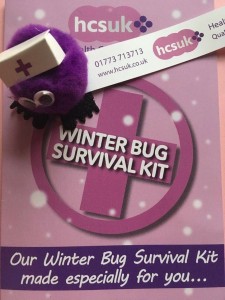What actions have you taken to prepare for winter bug season? (and our helpful tips on how to survive it)
Welcome to winter bug season! The months of December through to March are regarded as peak winter bug months, with seasonal flu and Norovirus being the most common forms.
The potential costs associated with an outbreak of infection within a care home are significant, mainly due to healthcare costs (money spent to treat complications) and lost productivity (people not being able to work because they are sick). However it has been proven by the European Society of Clinical Microbiology and Infectious Diseases that ‘ increased hand hygiene, the use of suitable PPE and increased disinfection practices, are the most cost-saving interventions for the prevention, control and containment of an outbreak.’
So how well are you prepared, today, right now, if you were to have an outbreak? And do you know exactly what you need to do in the event of an outbreak?
Here are 4 ways that Hcsuk are here to help you to plan, prepare and minimise the risks of an outbreak:

To prevent any infection spreading generally, Standard Infection Control Precautions (SICPs) must be used by all care workers all of the time when caring for all residents, their environments and their equipment.( Additional infection control precautions are needed to prevent norovirus spreading, as it can survive on any surface, including equipment, for at least a week and on refrigerated food for up to 10 days)
Infection control precautions:
• Ensure infection control policies are up to date, read and followed by all staff.
• Conduct a hand hygiene audit and reinforce staff education on the importance of hand washing and the correct technique.
• Ensure that liquid soap from a sealed cartridge and absorbent paper hand towels are available in all toilets, communal bathrooms including residents’ rooms/en suites.
• Where possible and safe to do so, use a 70% alcohol based hand sanitiser where hand washing facilities are not available (eg entrances/exits, residents’ lounge, dining room) and maintain supplies in view of increased usage. NB In the event of a D&V outbreak, it is only effective when used in conjunction with liquid soap and water.
• Use suitable PPE, including disposable gloves, tested against viral penetration, disposable plastic aprons and surgical masks where required.
• Ensure linen management systems are in place as well as clinical waste disposal systems including foot operated pedal bins.
• Maintain adequate levels of cleaning materials in anticipation of increased cleaning (eg disposable colour coded cloths, detergents and a virucidal cleaner/disinfectant)
Here's how Hcsuk can help you to plan, prepare and minimise the risks of an outbreak.
1. So you can get prepared – we have created two special ‘Winter Bug Survival Action Plan Checklists’ to help you to plan for an outbreak of Flu or Norovirus.
2. You can benefit from a series of audit services to advise you and recommend best practice on hand hygiene, correct glove usage, laundry hygiene and infection control and we can provide the fit for purpose product solutions which meet industry standards.
3. You will receive a range of sales support literature and training tools including handy posters on hand hygiene and laundry/ linen management.
4. We have created our own very special fun and informative Winter Bug Survival Kits with a range of samples and tools to help you plan and prepare.
We have a limited supply of Winter Bug Survival Kits** available to get you feeling all warm and fuzzy, but they are only available whilst stocks last so don’t delay, to order your Survival Kit and Winter Bug Survival Action Plan Checklists today or to get any more information about our audit services, call Beckie today on 01773 713713 or email us at sales@hcsuk.co.uk!!

**Please note all kits have now gone



